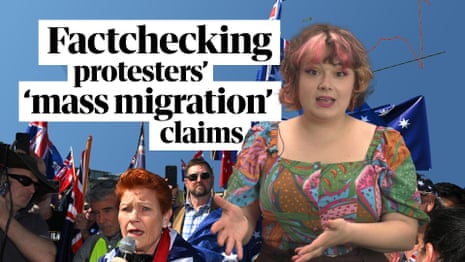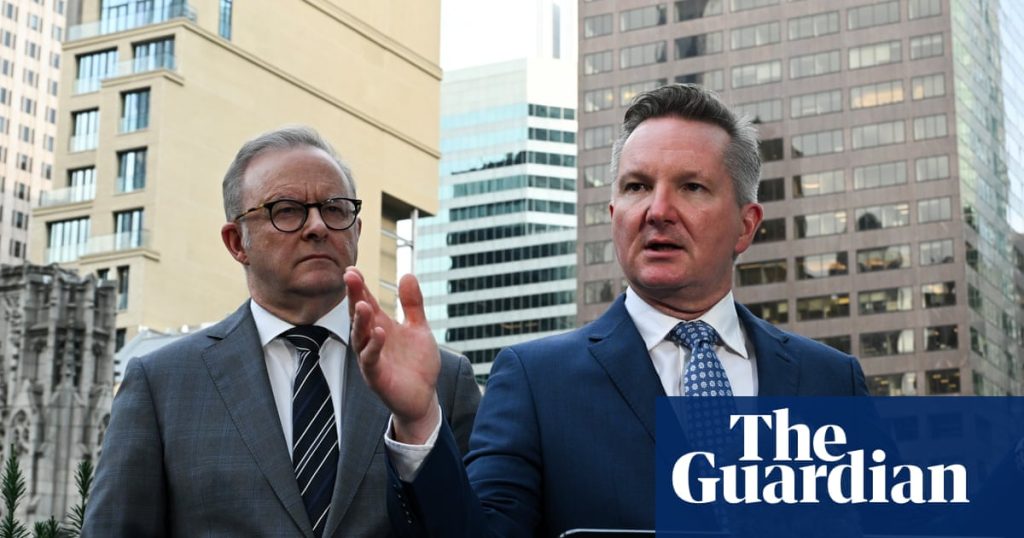Australian voters have backed the level of ambition of the Albanese government’s 2035 emissions reduction target, with just 13% wanting Labor to pursue steeper pollution cuts this decade.
But fewer than a third of voters believe the country is likely to achieve the new target of cutting greenhouse gas emissions between 62% and 70% from 2005 levels.
The latest Guardian Essential poll also found One Nation’s primary vote has doubled to 13% since the May federal election, putting support for the hard-right party above the Greens.
The federal government faced criticism from across the political spectrum after unveiling its 2035 target earlier this month, with the Greens and environmentalists dismissing it as too low and the Coalition attacking it as “economy-wrecking”.
The prime minister, in turn, said the target range was the “sweet spot” that would protect the environment and support the economy.
The poll of 1,001 people last week found almost half of Australians largely agreed, with 48% viewing the level of ambition as “about right”.
Younger voters were the most supportive, with 63% of 18 to 34-year-olds endorsing the target range.
Sign up: AU Breaking News email
Overall, 39% of voters thought the target was “too ambitious” while just 13% thought it was “not ambitious enough”.
That was despite climate scientists and environmental groups insisting the target range must include 75% to be credible.
The climate change minister, Chris Bowen, said 70% was the “maximum” ambition possible based on the advice of the Climate Change Authority as he maintained the target was consistent with the global aim to limit temperate rise to 1.5C.
The poll found voters were sceptical about the prospects of achieving the new target, with 33% believing it was “likely” to be met. Just 6% believed it was “very likely”.
The federal government remained optimistic about the future of the green energy transition despite Donald Trump’s return to the White House dimming hopes for the fight to contain global heating.
Trump used a speech last week to the United Nations to label climate change the “greatest con job ever perpetuated on the world”.
The poll found almost half of voters believe the Trump presidency was having a negative affect on climate change, compared to 21% who saw it as a positive.
Just 17% of respondents wanted Australia to be “more like the US”, a resounding message from voters ahead of Albanese’s first sit-down meeting with Trump in the US on 20 October.
On the domestic front, the poll picked up some anxiety about immigration levels with 53% of respondents agreeing that the permanent migration cap of 185,000 for 2025-26 was too high.
Sign up to Breaking News Australia
Get the most important news as it breaks
Privacy Notice: Newsletters may contain information about charities, online ads, and content funded by outside parties. If you do not have an account, we will create a guest account for you on theguardian.com to send you this newsletter. You can complete full registration at any time. For more information about how we use your data see our Privacy Policy. We use Google reCaptcha to protect our website and the Google Privacy Policy and Terms of Service apply.
after newsletter promotion
Some 40% viewed it as “about right” while just 8% thought it was too low.
The permanent migration program includes skilled and family visas and is one component of overall net overseas migration, which also counts students and working holidaymakers.

The rate of net overseas migration had subsided since a post-pandemic surge but remained a highly contentious political issues.
The latest poll found 69% of voters believed there was tension between people of different races and nationalities in Australia – a 10% jump from August 2024.
One of the most vocal opponents of the immigration rate was Pauline Hanson’s One Nation, which had enjoyed a substantial increase in support since the federal election.
The latest poll put One Nation’s primary vote at 13%, which was above the Greens on 11% and more than double the 6.4% it recorded at the May ballot.
Both Albanese and the opposition leader, Sussan Ley, suffered a dip in their personal support.
The prime minister’s approval rating had fallen into net-negative, with 46% of voters approving of his performance compared to 44% disapproving of it.
Ley’s approval rating fell to minus 9 (32-41), down from minus 2 (35-37) in August.

